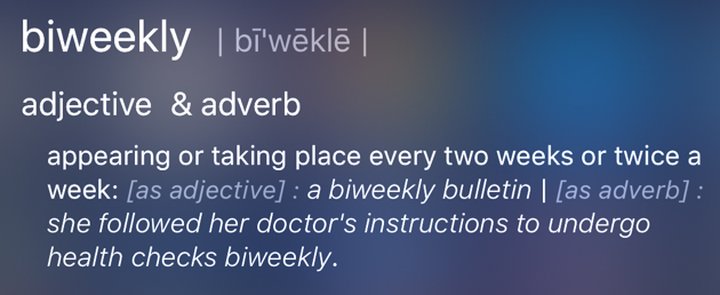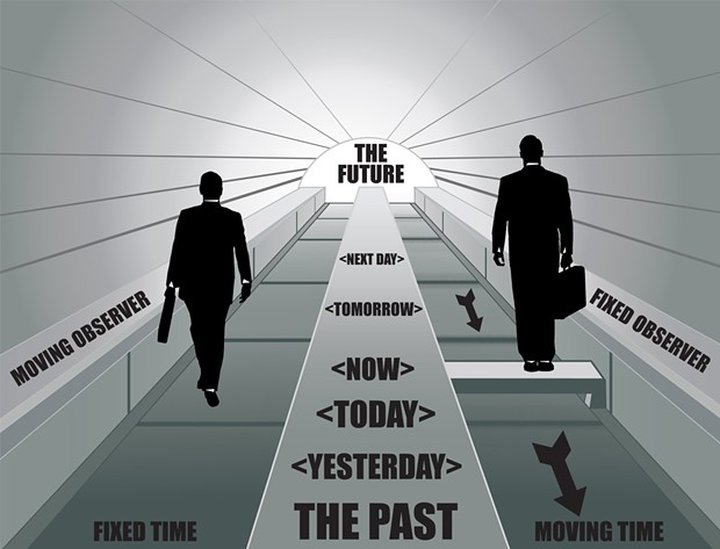I happen to write a
column for The Other Paper. No, not that
one. This
one. It appears biweekly.
“You mean you write two columns a week for them?”
“No, it comes out every other week.”
“Why didn’t you say so?”
“Because biweekly means every two weeks…doesn’t it?”

Carrying on…
“See you next Friday!” It’s Sunday May 26. Will we meet on Friday, May 31 or Friday, June 7?
“We moved the meeting up a day.” The meeting was set for Wednesday. Is it now on Tuesday or Thursday? Your response will establish whether you see yourself as (a) moving through time: “I passed the time happily;” (left side of graphic) or (b) you see time moving past you: “The year went by so fast.” (right side of graphic). In tests on college students, responders split roughly 50/50 on whether the meeting is now on Tuesday or Thursday.

Originally appeared in the North Coast Journal.
The future’s ahead of us. So why can’t we see it? We can only see “back then” — with eyes at the back of our heads? The Aymara Indians of Peru are famously logical about time. For them (and possibly New Zealand Maoris), the past is ahead (where they can “see” it) and the future is behind them, hidden from view. I wrote about this here.
(FYI, George Lakoff and Mark Johnson’s Metaphors We Live By — which is full of this sort of thing — is my first choice of a desert island book. Julian Jaynes’ The Origin of Consciousness in the Breakdown of the Bicameral Mind is a close second. There’s enough in those two books to last a lifetime.)
“Is your office on the ground floor or the first floor?” I ask. “Same thing,” you say. And I remember that the first floor in Britain is the second floor in the US and Canada.

I can’t tell you how much trouble we’ve had with chickens on the courthouse steps.
Tempus
fugit. I can’t write about ambiguity without referring to the
classic line, Time flies like an arrow, which is used in
linguistic classes to discuss puns and “antanaclasis” (the
repeated use of a word with a different meaning each time).
Interpretations include:
(Statement) Time, like an arrow, goes fast.
(Imperative) Measure how fast flies fly the same way you’d time the speed of an arrow.
(Imperative) You know how an arrow goes about measuring the speed of flies? Do it the same way.
(Statement) Fruit flies like a banana, but time flies prefer an arrow.
—and others too convoluted to repeat.
The sun goes around the Earth. I used to regularly teach an intro astronomy class. When I got to Copernicus, who posited a heliocentric (sun-centered) system (as opposed to everything orbiting the Earth), there was always someone insisting — correctly, but still irritatingly — that it depends on your point of view.
Noon = 12 a.m. or 12 p.m.? I still have trouble with this. Tell me I’m not alone.
“Stud Tires Out” was, according to linguist Stephen Pinker, a headline in New Hampshire newspaper when the state banned studded tires (I haven’t been able to confirm this, nor “Prostitutes Appeal to Pope.” You get the idea.
CLICK TO MANAGE